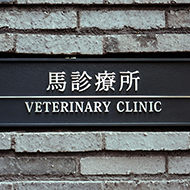Olympic horses receive state-of-the-art veterinary care

Biosecurity measures are in place across the entire equestrian venue to prevent any possible contamination.
Horses at the Tokyo 2020 Olympic and Paralympic Games are receiving high-tech veterinary care at Baji Koen Equestrian Park.
The veterinary clinic at the equestrian park has undergone a complete refurbishment for the games, with a completely new veterinary clinic and stables.
Funded by the Japan Racing Association (JRA), the new facilities offer routine and emergency services, to provide equine athletes with comprehensive and world-class veterinary care.
Included in the facilities are treatment boxes to be used by team veterinary surgeons and physiotherapists, a clinical pathology laboratory, radiography and ultrasound scanning, a pharmacy, and state-of-the-art high-tech surgery facilities.
Staffed by both domestic and international professionals, all experienced in advanced veterinary medicine, the service is equipped to provide advanced and world-class veterinary care to the horses.
The clinic also offers a veterinary ambulance service, which is available to access 24/7, alongside emergency care.
Dr Hiroko Aida, Tokyo 2020 veterinary service manager, commented on the new facilities: "In 2016 the JRA demolished the former veterinary clinic here at Baji Koen and built these fabulous facilities so that we can provide optimal care for the Olympic and Paralympic horses during the Games. And it has a double benefit as a great investment for the future”
Commenting on the team of veterinary surgeons currently working at the games, Aida said: “The veterinary surgeons we have onsite are some of the best in the world and it is a real honour to be a part of this team."



 The RCVS has announced a new version of its 1CPD mobile app, with enhanced features for veterinary surgeons and veterinary nurses to record their continuing professional development.
The RCVS has announced a new version of its 1CPD mobile app, with enhanced features for veterinary surgeons and veterinary nurses to record their continuing professional development.